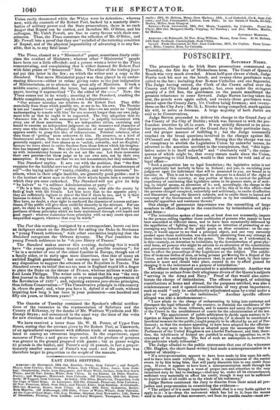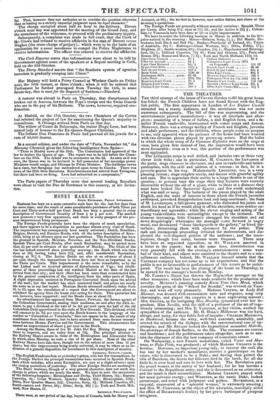POSTSCRIPT.
SATURDAY NIGHT.
The proceedings in the Irish State prosecutions commenced on Thursday, the first day of Michaelmas term. The Court of Queen's Bench was very much crowded. About half-past eleven o'clock, Judge Perrin took his seat on the bench, and twenty-three gentlemen were called to the bar ; including four Roman Catholics and one Separatist. The Judge having retired, the Clerk of the Crown called over the County and City Grand Jury panels ; but, even under the stringent penalty of a 201. fine, the gentlemen on the panels manifested the greatest reluctance to come forward. Judge Burton having taken his seat, the panels were again called, and twenty-three gentlemen were placed upon the County Jury, NI r. Crofton being foreman ; and twenty- three on the City Jury ; Mr. G. L. Brooke being compelled, much against his will, to serve as foreman. A. large majority of both Juries are said to be Conservatives.
Judge Burton proceeded to deliver his charge to the Grand Jury of the County of the City of Dublin ; which was listened to with the pro- foundest attention by all in court. It was strictly directed to its pecu- liar purpose, the instruction of the Grand Jury in their particular duty, and the proper manner of fulfilling it ; but the Judge necessarily touched on the broad questions involved in the charges against Mr. O'Connell and the other defendants. Stating that the charge was one of conspiracy to abolish the Legislative Union by unlawful means, he adverted to the assertion ascribed to the conspirators, that " this legis- lative union is in itself unlawful " and " absolutely void"; the conse- quence of which might be, that every statute made since the Union, and importing to bind Ireland, would to that extent be void and of no legal effect-
" Such a proposition has no legal foundation ; the legislative union is not only practically but lawfully in force in Ireland ; and you, in exercising your judgment upon the indictment that will be presented to you, are bound so to consider it. This is not to be supposed to amount to a denial of the right of the subjects of this country, or any portion of them, to contest the political expediency of continuing that legislative union in its present state, or of seek- ing, by lawful means, an alteration of it ; and, accordingly, the charge in the indictment applicable to this question is, or will be, this or to this effect—that the persons charged conspired, unlawfully and seditiously, to excite disaffection. and discontent among the Queen's subjects, and to excite them to hatred and contempt of the Government and constitution as by law established, and to untattfut opposition and resistance thereto."
One charge of paramount importance was the assembling of large numbers to effect changes in the constitution by intimidation and phy- sical force-
" The intimidation spoken of does not, at least does not necessarily, impute to the persons calling together those multitudes of persons who appear to have been assembled at different times, and to have been occasionally addressed by the appellation of 'fighting men,' any design or intention of promoting or en- couraging any infraction of the public peace on those occasions : on the con- trary, it would appear to me that a principal object, and one very earnestly pressed upon those multitudes, was the strictly abstaining from any attempt at those times to hazard a breach of the peace. The charge, as I understand it, is this—namely, an intention to intimidate, by the demonstration of great phy- sical force, all persons who might be adverse to an alteration of the constitution and government of the country; and also, and especially, by such demonstra- tion to affect the proceedings of the Legislature on the subject. The exhibi- tion of immense bodies of men, as being persons petitioning for a Repeal of the Union, and the asserting in their presence that, in part at least, by their inter- vention it must and should take place, seemed to me to afford ground for charging it in the indictment as a purpose of intimidation.'
The offence here charged amounted to a misdemeanour. Another was the attempt to seduce from their allegiance divers of the Queen's subjects "serving in the Army and Navy." Proof of that would also corro- borate the charge of intimidation. The offence charged, of soliciting contributions at home and abroad, for the purposes ascribed, was also a misdemeanour; and it opened considerations of very great importance, such as could "only be satisfactorily adjudicated upon by a trial under a plea of not guilty' to the indictment." Another specific offence alleged was also a misdemeanour-
" I now allude to the charge of endeavouring to bring into contempt and disrespect the legal tribunals of the country, to diminish the confidence of the Queen's subjects in those tribunals, and to assume and usurp the prerogative of the Crown in the establishment of courts for the administration of the law.
• * a The appointment of public arbitrators to decide upon matters in li- tigation or dispute between the Queen's subjects, (if it should be considered a beneficial measure for the public,) ought properly to be effected by an act of Par- liament; so that the measure appearing to have been adopted for the effectua- tion of it, may seem to have been so adopted upon the assumption that the Parliament of the United Kingdom is not a lawful Parliament, and that, there- fore, the inhabitants of Ireland are justified in acting in opposition to, or in contempt of its authority. The fact of such an assumption is, however, in this particular wholly inferential." The Judge alluded to the public statements that one of the witnesses (Mr. Hughes, the short-hand-writer) had made a misrepresentation in a matter of identity— Ifs misrepresentation appears to have been made by him upon his oath, and to have been made wilfully, that is, with a consciousness of the matter sworn to by him being false, that will justly disentitle him to any credit from you. If even it appears to have been a misrepresentation made through his negligence—that is' through a want of proper care and attention to the very important duty he had to discharge—that may be, under all its circumstances, sufficient very materially to affect his credit, though it may not be sufficient to deprive him of all credit as to the whole of his testimony.'
Judge Burton cautioned the Jury to dismiss from their mind all pre- judice and prepossession in examining the evidence-
" The subject of it is most important ; indeed, that is a very feeble epithet to apply to it : it is—from the movement which Ins led to it, from the means i
used n the conduct of that movement, and from its possible resulta—most aw-
fill 'That, however does not authorize us to consider the question otherwise than as leading to a strictly impartial judgment upon its legal character."
The charge occupied about half an hour in the delivery. Eleven o'clock next day was appointed for the meeting of the Grand Jury, and the attendance of the witnesses, to proceed with the preliminary inquiry. Subsequently, a complaint was made in full court, that the Clerk of the Crown had refused to receive affidavits in the case of Barrett versus Hughes (the cross-charge of perjury); which were to be the basis of an application for a quasi mandamus to compel the Police Magistrates to receive informations. The officer was ordered to receive the affidavits.



























 Previous page
Previous page